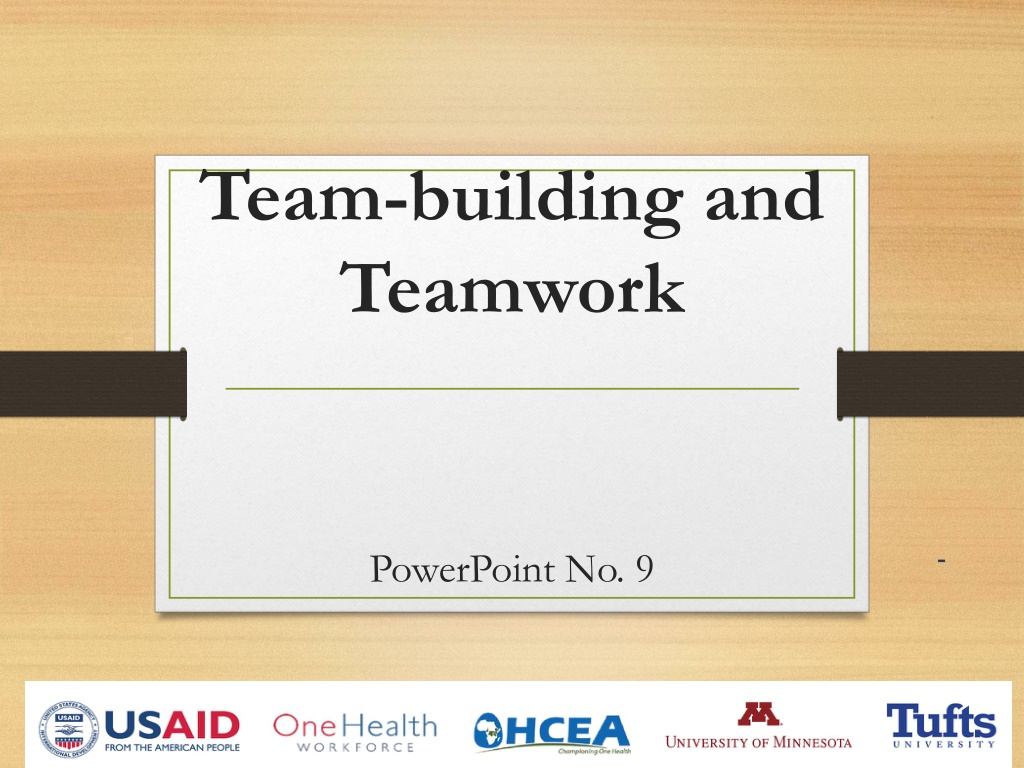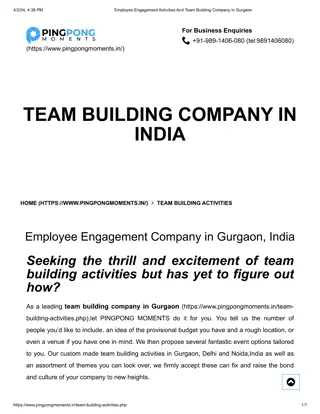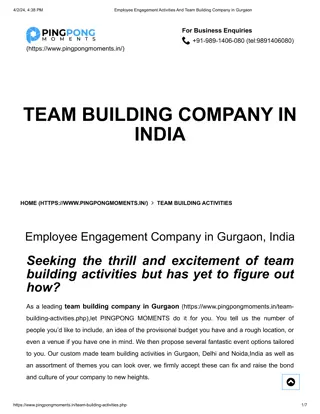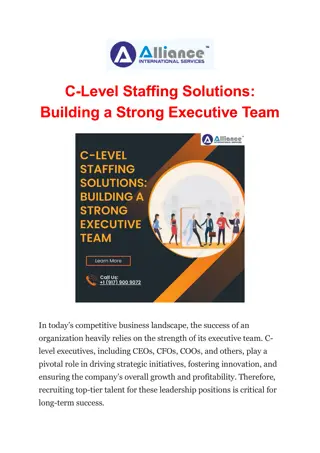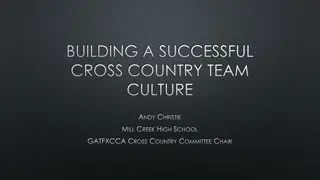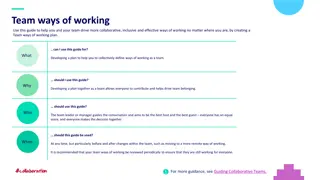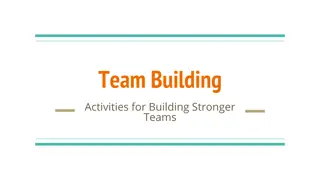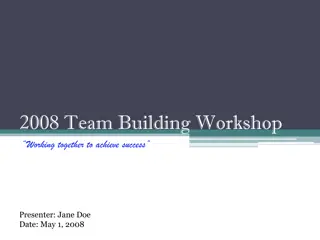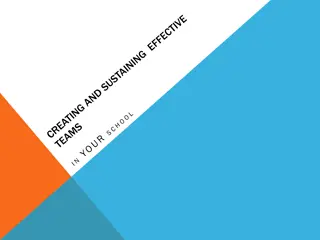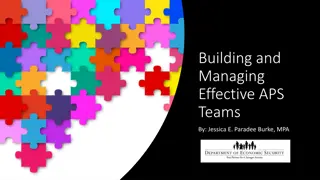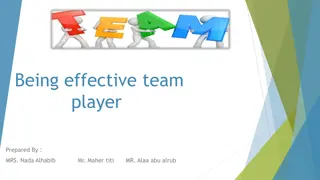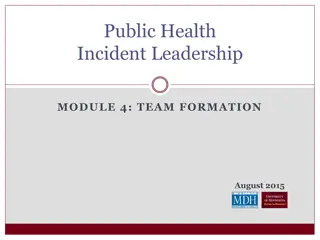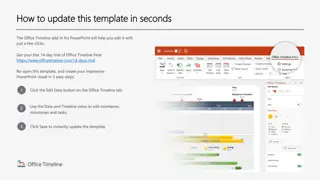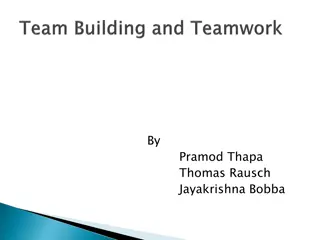Effective Team Building Process
Create a cohesive work group by aligning around goals, building relationships, clarifying roles, and solving problems. Understand the stages of team development: forming, storming, and norming. Encourage teamwork and collaboration to achieve shared objectives.
Uploaded on Feb 21, 2025 | 0 Views
Download Presentation

Please find below an Image/Link to download the presentation.
The content on the website is provided AS IS for your information and personal use only. It may not be sold, licensed, or shared on other websites without obtaining consent from the author.If you encounter any issues during the download, it is possible that the publisher has removed the file from their server.
You are allowed to download the files provided on this website for personal or commercial use, subject to the condition that they are used lawfully. All files are the property of their respective owners.
The content on the website is provided AS IS for your information and personal use only. It may not be sold, licensed, or shared on other websites without obtaining consent from the author.
E N D
Presentation Transcript
Team-building and Teamwork - - PowerPoint No. 9
Overall Module Goals By the end of the module, the participant should be able to: understand and demonstrate skills in teambuilding and teamwork. effectively participate and contribute to the purpose of a multidisciplinary team. 2/21/2025 2
What is teamwork? The process of working collaboratively with a group of people in order to achieve a goal. Teamwork means that people will try to cooperate, using their individual skills and providing constructive feedback, despite any personal conflict between individuals. 2/21/2025 3
Different people and skill 2/21/2025 4
What is team building? Team building is an ongoing process that helps a work group evolve into a cohesive unit. Goal setting: Aligning around goals Interpersonal-relationship management: Building effective working relationships Role clarification: Reducing team members role ambiguity Problem solving: Finding solutions to team problems 2/21/2025 5
FORMING Defines the problem Agrees on goals and formulates strategies for tackling the tasks Determines the challenges and identifies information needed Individuals take on certain roles Develops trust and communication 2/21/2025 7
Storming During the Storming stage, team members: realize that the task is more difficult than they imagined have fluctuations in attitude about chances of success may be resistant to the task have poor collaboration 2/21/2025 8
NORMING During this stage, members accept: their team team rules and procedures their roles in the team the individuality of fellow members Team members realize that they are not going to crash-and-burn and start helping each other. 2/21/2025 9
PERFORMING Team members have: gained insight into personal and team processes a better understanding of each other s strengths and weaknesses gained the ability to prevent or work through group conflict and resolve differences developed a close attachment to the team 2/21/2025 10
Tuckmans Model of Team Development Forming Storming Norming Performing P E R F O R M A N C E Inter dependence Independence Dependence Counter dependence TIME
Tuckmans Model of Team Development Forming Storming Norming Performing P E R F O R M A N C E Inter dependence - Tolerance - Open - Flexible - Maturity - Sharing - Energy Counter Dependence - Losing team members - Difficulties - Opting out - Confronting - Managing conflicts - Feeling stuck Dependence - Impersonal - Guarded - Polite - Watchful Independence - Developing skills - Getting organised - Systems established - Task focus - Confronting issues - Agreed procedures TIME
The Challenge of Team Development FORMING - establishing task and its demands; anxiety and uncertainty generate unhealthy stress STORMING - difference of opinion and method become apparent & often lead to conflict. Over stress is often experienced but can be best time for learning to work together if differences are faced, accepted and valued. NORMING - people agree way of working together on tasks. Usually healthy stress is generated. PERFORMING - builds on previous stages. Team members are likely to be in the Peaks , producing work of a high quality.
Where was your team during the exercise? Forming Storming Norming Performing P E R F O R M A N C E Inter dependence Independence Dependence Counter dependence TIME
Important Observations A team will not be fully effective unless it reaches the stage of performing/interdependence. Many teams accept storming as a normal way of operating, while a number of teams may never get beyond forming. Unless the process of norming is fully completed, teams may degenerate into storming. The amount of time taken to complete the cycle will vary tremendously between teams. Many factors determine how quickly a team will evolve towards effectiveness including: its size, geographical spread, frequency and duration of meetings, synergy of team types, stability of team membership, external influences and time pressures and the nature of its activities. Effective Communication is key!!
Forming Uncertainty about roles, looking outside for guidance. Storming Growing confidence in team, rejecting outside authority. Norming Concern about being different, wanting to be part of team. Performing Concern with getting the job done. General Observations Some attempt to define the job to be done. Team members resist the task demands. There is an open exchange of views about the team s problems. Resources are allocated efficiently and processes are in place to ensure that the final objective is achieved. Content Issues Team members look outside for guidance and direction. Team members deny the task and look for the reasons not to do it. The team starts to set up the procedures to deal with the task. The team is able to solve problems. Process Issues People feel anxious and are unsure of their roles. Most look to a leader or coordinator for guidance. People still feel uncertain and try to express their individuality. Concerns arise about the team hierarchy. People ignore individual differences and team members are more accepting of one another. People share a common focus, communicate effectively and become more efficient and flexible as a result. Feelings Issues 2/21/2025 17
What are the benefits of ground rules? Sets the tone for the engagement Can prevent future trouble Establishes norms and expectations for behaviours Fast track through conflict
An Example Respect for people and process Fairness equal time for speakers Listening listen to understand Openness to other points of view and outcomes Privacy confidentiality Commitment to be fully present
Exercise on team work (lost in the Mara) 2/21/2025 20
